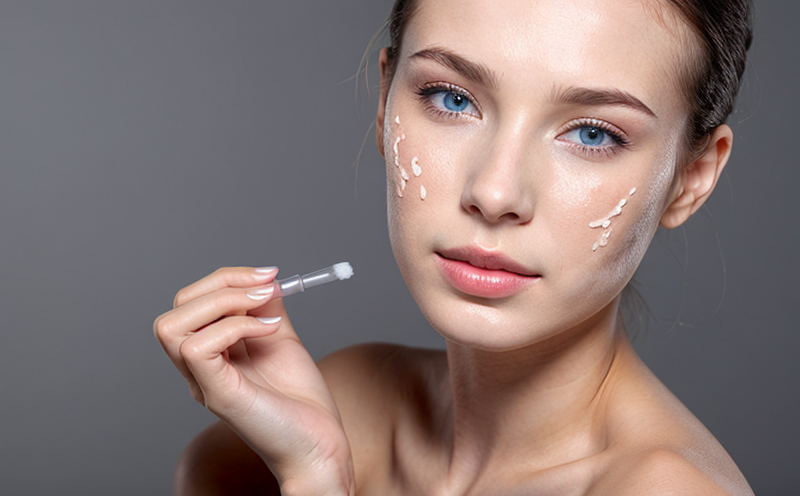Sensitization Testing of Natural Fragrance Blends in Cosmetics
As quality managers and compliance officers navigate the complexities of cosmetic product development, ensuring that their products are safe for consumers is paramount. Sensitization testing specifically addresses the potential allergenic properties of cosmetic ingredients, particularly those used in fragrances. This service focuses on natural fragrance blends, which have gained significant popularity due to consumer demand for more holistic and eco-friendly formulations.
Natural fragrance blends present unique challenges because they are not chemically standardized like synthetic alternatives. The variability in composition can lead to unpredictable sensitization risks. Our sensitization testing ensures that natural fragrances meet the stringent requirements set forth by regulatory bodies such as the European Union’s Cosmetics Regulation (EC 1272/2006) and its subsequent amendments, which mandate rigorous safety assessments.
The testing process involves exposing volunteers or cell cultures to the fragrance blend under controlled conditions. The objective is to observe any immune response that could indicate a sensitization potential. This is crucial for manufacturers who wish to avoid recalls and legal issues associated with allergenic products. By providing this service, we help companies comply with global regulations while also enhancing their brand reputation through safer product offerings.
Our approach combines advanced analytical techniques and thorough documentation of results to ensure accurate and reliable data. We utilize state-of-the-art equipment that can detect even subtle changes indicative of sensitization reactions. This precision is essential given the sensitive nature of natural ingredients and the importance placed on consumer safety in the cosmetics industry.
The significance of this testing cannot be overstated, especially as more consumers seek out natural products free from harsh chemicals. By offering this service, we contribute to a safer marketplace where consumers can trust that they are using high-quality, safe cosmetic products.
Scope and Methodology
| Test Parameters | Details | |
|---|---|---|
| Type of Fragrances Tested | Natural fragrance blends, including essential oils, extracts, and other plant-based compounds. | |
| Testing Methodologies | - In vivo tests using guinea pigs (EpiDerm®) | - In vitro tests on human keratinocyte cell lines (COR-tox™) |
| Safety Criteria | Assessment of dermal irritation and sensitization potential. | |
| Data Analysis | Statistical evaluation using validated software to determine thresholds for sensitization risks. |
The testing process begins with the preparation of the fragrance blend according to industry standards. Each batch is carefully mixed and then subjected to rigorous safety evaluations. The primary focus is on identifying any components that may trigger allergic reactions, which could pose health hazards to consumers.
For in vivo testing, we use a standardized protocol where the fragrance is applied topically to guinea pigs. This approach allows us to observe immediate and long-term effects, providing comprehensive insights into potential sensitization risks. In vitro methods involve exposing human keratinocyte cell lines to the fragrance blend under controlled conditions. These tests help identify molecular interactions that could lead to adverse reactions.
The data collected from both methodologies is meticulously analyzed using statistical tools designed specifically for this purpose. This ensures accuracy and reliability, which are critical when making decisions about product safety. Our team of experts interprets these findings to provide actionable recommendations tailored to each client’s needs.
Industry Applications
Sensitization testing plays a vital role in various stages of cosmetic development, from initial formulation creation to final product release. For quality managers and R&D engineers working in this sector, ensuring that their products comply with international standards is non-negotiable. By incorporating our sensitization testing service into their workflow, they can confidently introduce new natural fragrance blends to the market without risking consumer safety.
In addition to regulatory compliance, there are several other applications for this testing methodology. For instance, it helps companies identify and mitigate risks associated with using novel ingredients in formulations. This is particularly important given the rapid pace of innovation in the cosmetics industry. Furthermore, by understanding how different components interact within a fragrance blend, manufacturers can optimize their recipes to enhance efficacy while minimizing adverse effects.
From an R&D perspective, sensitization testing offers valuable information that can guide future product development efforts. It allows researchers to explore alternative sources for natural fragrances and develop safer alternatives when necessary. This not only improves the quality of cosmetic products but also fosters a more sustainable approach to ingredient sourcing.
For procurement teams, this service ensures that they are procuring materials from reputable suppliers who adhere to strict quality control measures. By verifying the safety of raw ingredients before incorporation into finished goods, they help maintain the integrity of the supply chain throughout manufacturing processes.
Eurolab Advantages
At Eurolab, we pride ourselves on delivering exceptional service and unparalleled expertise in cosmetic testing. Our commitment to excellence is reflected in our comprehensive range of services, including sensitization testing for natural fragrance blends.
Our experienced team of scientists and engineers brings deep knowledge of both the theoretical and practical aspects of this testing method. Leveraging cutting-edge technology, we ensure that every test conducted meets the highest standards of accuracy and reliability. This commitment to quality extends beyond just the technical capabilities; it also encompasses our unwavering dedication to customer satisfaction.
We understand that each client has unique requirements when it comes to product safety assessments. That’s why we tailor our services to meet individual needs, whether you require basic compliance testing or more advanced research-oriented studies. Our flexible approach ensures that no matter what stage your project is at, Eurolab can provide the support needed.
In addition to offering top-notch technical expertise, we prioritize timely delivery and transparent communication throughout the process. Clients receive clear reports detailing all findings along with recommendations for improvements where applicable. With us, you get more than just results—you gain peace of mind knowing that your products are thoroughly tested and ready for market release.





